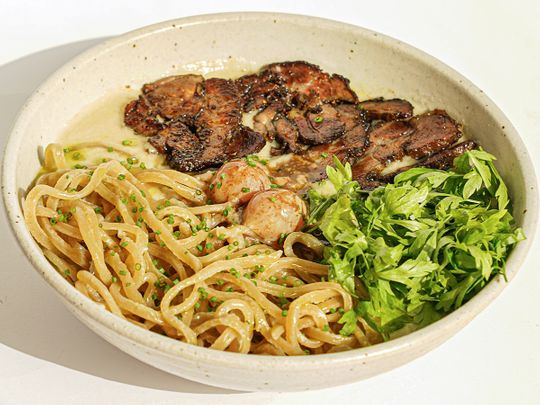Ingredients
Chicken and lamb paitan broth:
300 gms leek (including the dark green part) sliced crosswise, very thinly (washed)
35 gms (6 medium) of cloves garlic, minced
100 gms spring onion
15 gms ginger, minced
800 gms lamb bone marrow
800 gms Chicken bones
1½ ltr filtered water
Bread shoyu: (Alternatives: soy sauce or tamari)
1½ kg stale bread
3.23 ltr water
350 gms barley koji
350 gms salt
Emirati quzi lamb neck chashu:
500 gms (1 piece) lamb neck
15 gms coriander seeds
15 gms cumin seeds
15 gms fennel seeds
15 gms fenugreek seeds
2 dried red chili (optional)
1 piece cinnamon (small)
15 gms turmeric powder
80 ml olive oil
Homemade noodles: (Alternative: Udon Noodles)
200 gms all-purpose flour
90 gms filtered water
10 gms salt
Quail eggs:
4 pieces of quail eggs
40 ml of soy sauce or bread shoyu
Method
For the chicken and lamb paitan broth:
1. Place the lamb and chicken bones in a pressure cooker and cover with (1½ litres) water (make sure not to exceed the maximum fill line of your cooker). Bring to high pressure and cook for an hour and 20 minutes. Allow the pressure to release naturally.
2. After cooking in the pressure cooker, transfer the bones (remove lamb bone marrow) with liquid into the cooking pot. Add the vegetables and cook for another an hour on low heat.
3. Using a wooden spoon or potato masher, try to break up and crush the chicken bones in the pot into small pieces, bring mixture over high heat, stirring periodically, for 30 minutes to emulsify the broth.
4. In batches pour mixture through a fine mesh strainer directly into mixing bowl. Press firmly on solids to extract as much liquid as possible. Discard strained chicken solids and vegetables. Transfer broth into airtight container set aside while we make rest of the items.
For the bread shoyu:
1. Grind the stale bread into crumbs and then spread them onto a roasting tray lined with a Silpat baking sheet about ½-inch (6mm) thick.
2. Roast the crumbs at 163C for 45 to 50 minutes or until they are dark brown color. Allow the breadcrumbs to cool to room temperature and then combine with the rest of the ingredients.
3. Vacuum pack and let it rest for four to six months or alternatively keep in a jar under a crock weight.
4. The temperature at this stage is important: Keep in a warm dark place where the temperature should be around 24C to 31C, also humidity plays a big role here (we usually keep near the bread oven which creates a high humidity).
5. Strain and use.
*The fermentation process can take up to two to four weeks, and must be monitored for any mould. The process increases acidity. Protein and carbohydrate contents of sourdough are slowly broken down, creating umami presence in layered depth, while increased sweetness rounds bitterness and the caramelised flavour of the bread. The result is a rich sauce that is good on its own or is used to enhance dishes in combination with other ingredients.
For the Emirati quzi lamb neck chashu:
1. For Bzar (spice blend): Preheat the oven to 180C, mix all the seeds with cinnamon and chilis except turmeric powder, and spread on the tray, roast for six to seven minutes to release the aroma. Once the mixture cools down, grind smooth using a spice grinder, add the turmeric powder, and fold and mix gently.
2. For the Lamb: Preheat oven to 160C. Place the lamb on a large, flat surface, rub half of the olive oil, add spice Bzar and rub all over the lamb, with a touch of salt, roll to form a long cylinder shape, secure with the kitchen string
3. Heat the remaining oil in a large frying pan over high heat. Add lamb to the pan, cook the lamb until golden brown, while turning occasionally (three minutes on each side). Transfer lamb neck to a casserole and add 400 ml of water, cover with lid, and put in the oven to cook for an hour. Remove the lid and turn the neck over, and return the casserole to the oven, cook for another 30 minutes. Remove the casserole from the oven, remove the lamb to a plate and let it rest in a warm place until it cools.
4. Place in the chiller to cool down for an hour.
5. Slice into thin slices.
For the homemade noodles:
1. Make the dough by combining all ingredients together, let it rest for 30 minutes.
2. Knead the dough into large sized ball, until the dough achieves the bouncy texture.
3. Let it rest for two more hours at room temperature.
4. Roll out the dough into a thin, flat layer.
5. Fold and cut into thin strings (noodles) using a sharp knife.
For the quail eggs (perfectly cooked whites and runny yolks):
1. Bring salted water to boil, place the quail eggs for exactly two minutes 30 seconds.
2. Peel and rinse in cold water.
3. Add to the soy sauce or homemade bread shoyu and keep in the chiller for an hour.
To assemble:
1. In a large bowl, add 10 ml of soy sauce or bread shuyu. Heat the piatan broth until boil, meanwhile blanch the udon noodles for two minutes in boiling water.
2. Add noodles to the bowl and mix well with soy or bread shoyu until the sauce costs the noodle. Pour the paitan broth, add sliced lamb neck slices on top.
3. Garnish with coriander leaves (optional) and halved quail eggs. Enjoy!
Recipe courtesy: Teible
Share your recipes with us on food@gulfnews.com
This recipe was a part of the Brand Dubai Ramadan Recipes Guide






